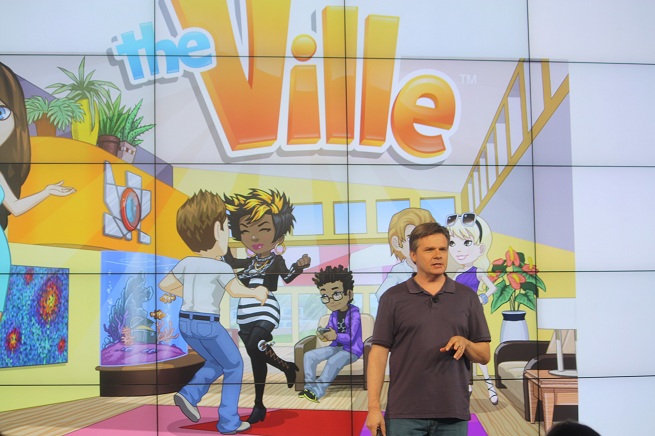
For sure, Zynga didn’t show anything that blew away consumers or investors. Instead, it offered impressive usage stats, sequels, and a solid set of games in familiar, popular genres that other game publishers already serve. Zynga might roll right over its competitors in those categories because it’s the big kahuna of social games.
[aditude-amp id="flyingcarpet" targeting='{"env":"staging","page_type":"article","post_id":480789,"post_type":"story","post_chan":"none","tags":null,"ai":false,"category":"none","all_categories":"business,games,","session":"A"}']It’s a perfectly good strategy for a market leader, and it’s worked for Zynga before. When a rival came up with a farm game, Zynga created a farm game that worked better and was more social. The company’s goal is to have its games be the most entertaining and the most social in a category. Investors ought to be happy about that strategy, since it has worked for years now and enabled Zynga to go public. But they weren’t.
I think one reason is that Zynga showed only its “red ocean” strategy, not a “blue ocean strategy.” Zynga is charging head-on at its rivals, fighting for market share with the sharks as they go after the meat (in this case, Facebook players) in the bloody red ocean. The concept here was chronicled in 2005 in the book “Blue Ocean Strategy” by W. Chan Kim and Renée Mauborgne. In a red ocean battle, the market share is fixed, and competitors fight each other for it in a zero-sum game. But in the blue ocean, where there are no competitors, a company can be successful by expanding the size of the market.
AI Weekly
The must-read newsletter for AI and Big Data industry written by Khari Johnson, Kyle Wiggers, and Seth Colaner.
Included with VentureBeat Insider and VentureBeat VIP memberships.
Zynga did this in the early days of Facebook games, when it pioneered the market for free-to-play online games such as Zynga Poker, Mafia Wars, and FarmVille. (Sure, it was accused of copying then as well). The company picked up middle-aged women and other people who were not hardcore gamers. As Facebook grew by the hundreds of millions, so did Zynga. It did not simply steal gamers from the existing console game publishers.
But this week, just about every title that Zynga announced was in direct competition with a rival. The Ville, introduced by game designer Mark Skaggs above, is squarely aimed at taking players away from Electronic Arts’ The Sims Social. By the same token, EA’s own SimCity Social is aimed at Zynga’s CityVille. That’s a red ocean fight.
With bubble shooter titles such as Bubble Safari and Ruby Blast, Zynga is going after rival King.com, which has soared in popularity in the last year with games that have short, one-minute gameplay times, much like arcade titles. And with its Matching with Friends game, Zynga is going after Wooga’s Diamond Dash and PopCap’s Bejeweled Blitz.
Alex Dale, chief marketing officer at King.com, said, “Zynga is spreading itself across many categories – resource management, ersatz gambling, casual social, and so on. It will be interesting to see how things will work out given their extensive reach.”
This is a good point. Zynga has nearly 3,000 employees and more than 150 veteran game designers. This week, Zynga only showed five of the games that are under development across a huge development organization. But Zynga doesn’t have an infinite amount of resources to go head-to-head against everybody. It has to choose wisely.
Wright Bagwell, the director of design at Zynga, defended his company’s strategy. If you went to the Electronic Entertainment Expo (E3) show in Los Angeles, it seemed like there were too many games where “guys with 5 o’clock shadows” were shooting everyone in sight. Zynga’s games reach a far larger audience, and that is exciting for game designers, Bagwell said. And the skill in creating these games isn’t just in the choice of topic but in the capability to create a service that lasts forever. That’s often where Zynga adds value in the industry; players see that, but critics who don’t play its games do not.
[aditude-amp id="medium1" targeting='{"env":"staging","page_type":"article","post_id":480789,"post_type":"story","post_chan":"none","tags":null,"ai":false,"category":"none","all_categories":"business,games,","session":"A"}']
“We know what genres work really well,” Bagwell said, noting how the company is religious about analytics feedback. “I feel like we are trying cool new things. We are doing new games that we are superexcited about. I feel the company is trying a lot of genres, lots of different things.”
By going after these players, Zynga is picking fights with the largest makers of Facebook games, and it’s several times bigger than all of them. It can use its scale advantages, such as its capability to cross-promote games, to defeat them. It has also invested heavily in data center infrastructure, allowing it to host more players at lower costs. And it can host games at higher speeds, allowing it to add features such as synchronous multiplayer gaming to its Bubble Safari game.
Zynga is using the brute force method of fighting its rivals. That’s not efficient, and at some point, it will run out of the resources to fight everyone and innovate at the same time. It’s not an elegant way to win, and someone who comes up with a more innovative, blue ocean strategy will take the lead.
Zynga knows that it has to come up with different kinds of games, but it doesn’t have to design every one of them. So it started its third-party publishing program, where it publishes games built by outside developers. Those developers are free to take risks and swim out to the blue ocean. So far, there isn’t much to show except a game dubbed Rubber Tacos. That’s not likely to be Zynga’s savior, but something like it, generated by a small and creative team, probably could be.
[aditude-amp id="medium2" targeting='{"env":"staging","page_type":"article","post_id":480789,"post_type":"story","post_chan":"none","tags":null,"ai":false,"category":"none","all_categories":"business,games,","session":"A"}']
VentureBeat's mission is to be a digital town square for technical decision-makers to gain knowledge about transformative enterprise technology and transact. Learn More
